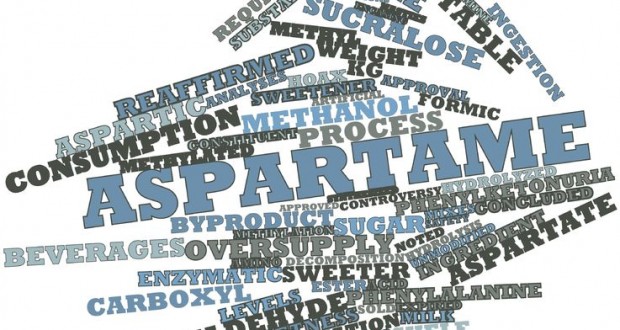Do you struggle with the question, “Diet or regular?” when ordering soda at a restaurant? Regular soda doesn’t seem like the right choice. It’s loaded with sugar, 8 teaspoons on average, and comes with its own set of health concerns.
Diet soda has no sugar, but what about the artificial sweetener it contains?
Aspartame is the primary artificial sweetener used in popular diet sodas today due to its sweetness factor. This food additive is estimated to be 200 times sweeter than regular sugar, but without all the calories. Is diet soda the right choice then?
Let’s dig a little deeper.
THE MAKING OF AN ARTIFICIAL SWEETENER
Aspartame is the result of combining phenylalanine (an amino acid), and aspartic acid (a brain excitotoxin), resulting in a protein molecule consisting of two amino acids.
This process involves:
- Providing food for genetically modified E. coli bacteria
- Gathering the resulting protein waste (in other words, feces)
- Combining this waste with methanol and alcohol
Doesn’t sound too appetizing does it?
What is even more unappetizing is the dissention surrounding aspartame and the decision made by the Food and Drug Administration (FDA) to give the chemical the green light for use by the general public.
ASPARTAME’S HISTORY
Where did it all begin? Aspartame was actually “discovered” purely by accident in the 1960s by a G.D. Searle & Company researcher who was focused on perfecting a new drug to treat ulcers. That discovery was just the beginning of what would become one of the biggest controversies surrounding the FDA and its approval of a food-like substance.
CONTROVERSIAL SWEETENER
The chain of events that led up to aspartame’s approval and staying power in the marketplace demonstrates the power of our government to dictate what we should and should not eat; no matter how bad it is for us!
These events are as follows:
- Aspartame was approved by the FDA in 1974 based upon Searle’s research findings.
- Serious flaws were found in how Searle’s tests were conducted and their findings reported.
- In 1975 the FDA task force found numerous discrepancies and put the chemical’s approval on hold before it actually hit the market.
- The FDA stated Searle’s research was, “…at best sloppy…”
- The FDA sent a file on the artificial sweetener to the United States attorney’s office to see if a grand jury indictment was warranted.
- Samuel Skinner, the United States attorney in charge of the grand jury investigation withdrew from the case when he began discussing the possibility of a job with a Searle Chicago law firm (which he later accepted).
- The investigation was stalled and the statute of limitations ran out for the case. The investigation was then dropped.
- In 1980 two separate panels were commissioned by the FDA to investigate aspartame’s safety. Both panels agreed more research needed to be done and agreed aspartame should not be approved at that time. The panels also expressed concerns about aspartame use and a possible connection to brain tumors and malignancies.
- In 1981 Dr. Arthur Hull Hays Jr. was appointed FDA commissioner by President Ronald Reagan. Dr. Hays overruled all the panels’ findings and approved aspartame for use in non-liquid products. Dr. Hays left his position sometime later and took a position with a public relations firm for Searle.
The following year Searle petitioned the FDA to approve aspartame’s use in liquids. The National Soft Drink Association (in addition to others), questioned the safety of using aspartame in this way due to the toxins (including formaldehyde), which were released when soda was exposed to higher temperatures.
ASPARTAME WAS APPROVED FOR USE IN LIQUIDS IN 1983.
MORE COMPELLING EVIDENCE
Dr. Ralph G. Walton, M.D., professor and chairman of the Department of Psychiatry
at Northeastern Ohio Universities College of Medicine, in his concern for public health and safety, reviewed 164 aspartame studies, some of which were industry sponsored and some which were not. The 74 studies funded by the NutraSweet industry attested to the safety of aspartame while the vast majority (83) of the 90 independent studies found problems with the sweetener’s use. The source of funding seemed to dictate the outcome of these studies.
It is quite apparent that aspartame’s approval by the FDA is based upon flawed studies as well as pressure from business and political influences. And who pays the price?
Dr. John Olney would probably say the public pays the price. A neuroscientist in the Department of Psychiatry at Washington University Medical School and someone who has studied the effects of aspartame for 20 years, Dr. Olney examined brain tumor rates and their possible link to aspartame consumption. And what did he find? He found enough evidence to reassess the chemical’s use based upon:
- Abnormally high rates of brain tumors in laboratory animals fed aspartame (with control animals exhibiting no brain tumors at all).
- Aspartame’s potential to mutate.
- The increase in the incidence of brain tumors in the United States (as well as several other industrialized countries), and the timing of aspartame’s appearance on the market.
Still not convinced aspartame is detrimental to your health?
Many proponents of aspartame use claim the amount of aspartame taken to induce changes in the brain far exceed any amount a consumer would be able to ingest; however, as far back as 1983 the New England Journal of Medicine published the findings from a study which found neurological changes occurred after consuming aspartame in very small amounts. How small? Amounts so small that a young child could easily consume the toxic amount in just one day.
REACTIONS TO ASPARTAME
In 2002 the Aspartame Toxicity Information Center provided the FDA with 551 complaints regarding toxic reactions to aspartame. These were only a small percentage of the approximately 10,000 complaints consumers have made against the artificial sweetener.
These complaints centered around the:
- Eyes (compromised vision, pain)
- Ears (compromised hearing, ringing, sensitivity)
- Skin (hives, eruptions)
- Chest (pain, rapid heart rate)
- Lungs (respiratory complications)
- Emotions (depression, anxiety)
- GI tract (pain, nausea, diarrhea, bloody stools)
- Brain (headaches, dizziness, seizures, tremors, confusion)
ASPARTAME AND DIABETES
Reactions were not limited to these areas but also affected the endocrine system. Diabetics reported increased diabetic symptoms and in some cases even credited aspartame with triggering the disease. Frequent attacks of low blood sugar were also reported; a huge concern for those struggling to control their diabetes.
What about weight gain? Weight is a contributing factor to diabetes. Is aspartame contributing to weight gain too? Quite possibly.
If psychologically you believe you are consuming fewer calories in your choice of beverage do you merely allow yourself extra calories from other sources? Are these sources healthy and low in calories or not so healthy and calorically dense?
What about the other theories revolving around weight gain and the consumption of aspartame in diet soda and other foods? Aspartame may actually increase appetite and stimulate fat storage in the body.
ASPARTAME AND PKU
As dangerous as aspartame is for diabetics aspartame is especially dangerous for those afflicted with phenylketonuria (PKU), an inherited metabolic disorder. PKU sufferers must limit the amount of the amino acid phenylalanine they ingest or risk an array of side effects, including neurological damage. Don’t forget this amino acid is one of the components of aspartame and can be potentially life-threatening for those with PKU.
HIDDEN SOURCES
Marketed as NutraSweet, Equal, and now AminoSweet, are you even aware of what you are purchasing? You may innocently be ingesting aspartame and not even know it! In addition to diet soda, other foods (there are over 6,000), which contain aspartame include:
- Gum
- Yogurts
- Toothpaste
- Supplements
- Flavored water
- Powdered drinks
- Breakfast cereals
- Packeted sweeteners
- Drugs prescribed by your very own doctor!
Read labels! In addition to diet, look for the words sugar-free, low-sugar, light, low-carbohydrate, and low-calorie, as these products may also contain aspartame.
PROTECT YOURSELF
Whether you are diabetic, have PKU, or are just looking out for your health in general, focus your diet around whole foods, not processed ones. This simple choice will allow you to avoid exposing yourself to aspartame (and a myriad of other unhealthy ingredients), and the negative effects these food substances can have on your health and well-being.
Perhaps the correct answer to “Diet or regular?” is “Neither, thank you!”
References
http://articles.mercola.com/sites/articles/archive/2013/03/13/unlabeled-aspartame-use.aspx
http://agris.fao.org/agris-search/search/display.do?f=1984/US/US84003.xml;US8466072
http://europepmc.org/abstract/MED/8939194/
http://www.sourcewatch.org/index.php?title=Aspartame
http://www.onhealth.com/artificial_sweeteners/page8.htm
http://articles.mercola.com/sites/articles/archive/2013/03/13/unlabeled-aspartame-use.aspx
http://dorway.com/aspartame-the-bad-news-repost/peer-reviewed-aspartame-studies/
http://www.youtube.com/watch?v=yCoBuTr0Or0
 Diabetic Kitchen
Diabetic Kitchen





Recent Comments